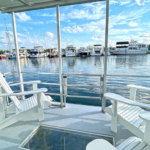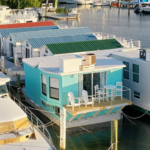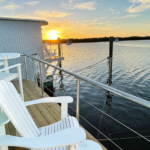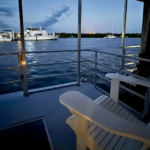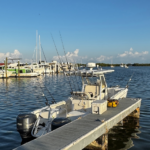
Can Houseboats Go in the Ocean? Exploring Capabilities and Limits
Houseboats have become an increasingly popular lifestyle choice, offering a unique blend of home and travel. Whether moored at a peaceful marina or floating on a tranquil lake, they provide a serene and adventurous way of living. But for those with a craving for saltwater horizons and coastal cruising, one question stands out can houseboats go in the ocean?
The short answer is: it depends. Not all houseboats are created equal. Some are designed purely for inland waterways, while others are purpose-built to handle more demanding ocean conditions. In this blog, we’ll explore the capabilities, limitations, and safety considerations for taking a houseboat into the ocean.
Understanding Houseboat Design
Before determining can houseboats go in the ocean, it’s essential to understand how houseboats are built and how their design impacts their seaworthiness.
Houseboats are primarily designed for calm and protected waters lakes, rivers, and inland bays. Their structure emphasizes comfort and space over speed or stability in rough water.
Flat-Bottom Hulls
Many houseboats are equipped with flat-bottom or pontoon-style hulls. These offer excellent stability in calm waters but fare poorly in large waves and ocean swells. In rough seas, a flat-bottomed boat can be difficult to control, making it risky for open ocean travel.
Low Freeboard
The freeboard is the distance from the waterline to the deck. Houseboats typically have low freeboards, which can make them vulnerable to taking on water in rough conditions.
Lightweight Construction
Unlike offshore yachts or cruisers, most houseboats are built with lightweight materials. This enhances buoyancy and fuel efficiency but reduces durability in heavy weather.
Given these features, you may already suspect the answer to can houseboats go in the ocean leans toward caution—but the full picture is more nuanced.
Types of Houseboats and Ocean Capability
Not all houseboats are completely unsuited for the ocean. Some are engineered with open-water travel in mind. Let’s look at three types of houseboats to evaluate their ocean readiness.
1. Pontoon Houseboats
These are the most common type and typically designed for inland lakes and rivers. They have low clearance, flat hulls, and limited structural integrity for large waves. The answer to can houseboats go in the ocean for this type is a definite no they’re not made for the ocean and can be hazardous in open waters.
2. Catamaran-Style Houseboats
Catamaran hulls offer more stability and are better equipped to handle mild ocean conditions, especially in coastal areas or intercoastal waterways. However, they still lack the deep V-hull of true offshore vessels. They are suitable for calm coastal passages but still require good weather and preparation.
3. Ocean-Ready Houseboats
These are custom-built or modified vessels that combine houseboat comfort with yacht-level seaworthiness. They feature reinforced hulls, higher freeboards, and often powerful engines to handle currents and rougher seas. If you’re asking can houseboats go in the ocean, this type makes it possible—but these are rare and expensive.
Safety Concerns in Ocean Conditions
Assuming you find or own a houseboat that is technically capable of going offshore, there are still major safety issues to consider. Even experienced boaters face challenges in ocean environments.
1. Weather Dependency
Ocean conditions can change rapidly. While lakes and rivers offer relative predictability, the ocean is far less forgiving. Swells, high winds, and sudden storms can be disastrous for an under-equipped vessel.
2. Stability and Buoyancy
The ocean is dynamic. If your houseboat lacks proper ballast, it may not remain stable in rolling waves. A flat-bottom hull might rock dangerously or even capsize in turbulent water.
3. Structural Integrity
Saltwater is corrosive and puts more strain on your boat’s structural components. Engines, electrical systems, and hull materials must be marine-grade and resistant to salt corrosion.
4. Navigation and Emergency Equipment
Coastal and oceanic navigation requires GPS, radar, VHF radio, life rafts, EPIRBs, and other safety tools. Many basic houseboats lack these systems, making it risky to venture out.
In short, even if the answer to can houseboats go in the ocean is technically yes, that doesn’t mean it’s safe without the right vessel and preparation.
Legal and Insurance Considerations
Before taking your houseboat into the ocean, you’ll also need to consider regulations and insurance requirements.
Vessel Registration and Classification
Different jurisdictions may classify houseboats differently. Some coastal or maritime laws do not allow certain types of vessels to leave protected waters. Check with local maritime authorities to ensure compliance.
Insurance Coverage
Most houseboat insurance policies only cover inland or protected waters. If you’re planning an ocean journey, you’ll need a special policy and some insurers won’t provide coverage for ocean travel in a traditional houseboat.
So, if you’re seriously asking can houseboats go in the ocean, you’ll need to review your insurance policy and likely purchase a rider or upgrade your plan.
Real-Life Examples: Houseboats That Made It
There have been rare cases where houseboat owners have modified their vessels for coastal travel. Some long-distance liveaboards add reinforced hulls, trim tabs, and marine electronics to create seaworthy homes.
One notable example is “The Floating Seahorse” in Dubai, a luxury houseboat with submerged bedrooms and open-sea compatibility. Another is the “Naval Live-in Yacht” style seen in Europe—custom designed to cruise between ports.
These examples prove that the answer to can houseboats go in the ocean is yes—with the right design, budget, and expertise.
Alternatives to Ocean Travel in a Houseboat
If your houseboat isn’t suitable for full ocean passage, you can still enjoy a coastal lifestyle in other ways.
1. Intercoastal Waterways
These protected routes allow houseboats to explore long stretches of coast without exposure to the open ocean. In the U.S., the Intracoastal Waterway (ICW) spans over 3,000 miles of navigable inland routes, perfect for houseboats.
2. Barge Style Cruising
Some houseboats are towed short distances between protected marinas or harbors. This allows ocean-like travel with reduced risk.
3. Marina-Hopping Along the Coast
You can use local towing services or short calm-weather runs to move your houseboat from one safe harbor to another along the coastline.
So, even if the answer to can houseboats go in the ocean is a no for your specific model, you can still enjoy coastal life with strategic planning.
How to Make a Houseboat Ocean-Ready
If you’re determined to turn your houseboat into an ocean-capable vessel, several modifications are essential:
-
Reinforce the Hull: Add fiberglass layers or change the hull entirely.
-
Upgrade Engines: Install reliable twin engines with saltwater cooling systems.
-
Increase Freeboard: Modify or raise side walls and decks.
-
Install Marine Electronics: Include radar, autopilot, AIS, GPS, and radio.
-
Safety Gear: Equip with life rafts, flares, EPIRB, and PFDs.
These changes can cost thousands of dollars, but if done correctly, they can shift the answer from can houseboats go in the ocean from a cautious no to a confident yes.
So, can houseboats go in the ocean? The realistic answer is only if they are specifically built or modified for it. Most standard houseboats are designed for calm, inland waters and should not venture into open seas. The risks in rough weather, strong currents, and saltwater exposure are too high for traditional designs.
That said, with the right design and preparation, some houseboats can handle coastal waters, particularly under ideal conditions and with experienced crew. Whether you’re dreaming of taking your houseboat on a sea journey or just curious about its potential, understanding the limits of your vessel is the first step toward safe and enjoyable boating.
Frequently Asked Questions (FAQs)
Can houseboats go in the ocean without modifications?
Most cannot. Traditional houseboats are designed for calm waters and lack the structural integrity needed for ocean travel.
What kind of houseboat can go in the ocean?
Ocean-ready houseboats are custom-built or heavily modified to withstand saltwater, waves, and marine navigation challenges.
Can I live on a houseboat by the coast without entering the ocean?
Yes, many coastal marinas and harbors provide safe mooring and access to ocean views without requiring open-water travel.
Do houseboats need a captain’s license for ocean travel?
Depending on your location and boat size, a boating license or maritime certification may be required for ocean navigation.
How can I make my houseboat safe for coastal travel?
Start by reinforcing the hull, upgrading navigation and safety equipment, and consulting with marine engineers for ocean-readiness.

